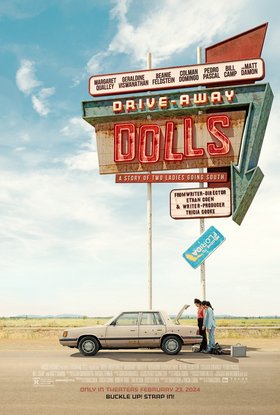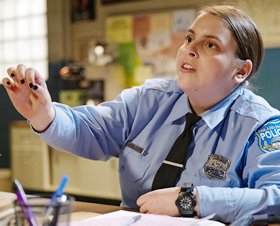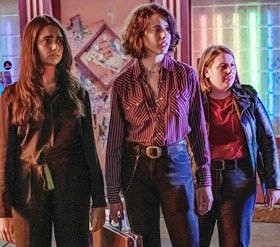Drive-Away Dolls
 for crude sexual content, full nudity, language and some violent content.
for crude sexual content, full nudity, language and some violent content.
Reviewed by: Jim O'Neill
CONTRIBUTOR
| Moral Rating: | Extremely Offensive |
| Moviemaking Quality: |
|
| Primary Audience: | Adults |
| Genre: | Action Crime Comedy |
| Length: | 1 hr. 24 min. |
| Year of Release: | 2024 |
| USA Release: |
February 23, 2024 (wide release) DVD: April 23, 2024 |





Ethan Coen has said of this film, “It’s a pure horror film, and it gets very bloody.”
FILM VIOLENCE—How does viewing violence in movies affect families? Answer

Illegal drug trade
Inept criminals

Lesbian road trip story
GAY—What’s wrong with being Gay? Answer —Homosexual behavior versus the Bible: Are people born Gay? Does homosexuality harm anyone? Is it anyone’s business? Are homosexual and heterosexual relationships equally valid?
What about Gays needs to change? Answer —It may not be what you think.
Read stories about those who have struggled with homosexuality
| Featuring |
|---|
|
Margaret Qualley … Jamie Geraldine Viswanathan … Marian Beanie Feldstein … Sukie Bill Camp … Curlie Pedro Pascal … The Collector Matt Damon … Senator Gary Channel See all » |
| Director |
|
Ethan Coen |
| Producer |
|
Ethan Coen Tim Bevan See all » |
| Distributor |
“A joyful heart is good medicine. A crushed spirit dries up the bones… a discerning person keeps wisdom in view, but a fool’s eyes wander to the end of the earth.” —Proverbs 17 excerpt
The Coen brothers have an idiosyncratic style that works well when they tap a grounded source (“True Grit,” “No Country for Old Men”) or mold a twisty plot around a balanced narrative (“Fargo” “Inside Llewyn Davis”) but not so well when they launch an offbeat caper and spin it like a top while ignoring its axis (“Hail, Caesar!” “The Ladykillers”).
As a team, the brothers hold an estimable position among cinema’s small group of brother directors: the Lumieres, the Tavianis, the Maysles, and the Safdies. Now, however, the Coen siblings have begun to go their separate ways after a forty-year partnership that began with the film “Blood Simple” in 1984.
Joel Cohen’s 2021 solo effort, “The Tragedy of Macbeth” succeeded despite its unsound casting because the elder Coen stuck close to Shakespeare’s text while enriching its dramatic spirit by adding an ethereal touch that stage productions struggle to evoke.
Ethan Coen, meanwhile, cannot seem to establish a solo footing. His 2022 documentary, “Jerry Lee Lewis: Trouble in Mind,” revealed more trouble for the man behind the camera than the one in front of it. Lewis seems to be leading his director around on a leash in a kind of organ grinder-monkey act that has Ethan dancing to the tune of Jerry Lee, a consummate entertainer, a good talker, and a sly fox.
Coen’s documentary fails where other celebrity bios, notably the recent ones about Joan Rivers and Amy Winehouse, soar by uncovering the truth at the heart of a life lived under the spotlight, one that shines bright but also goes dim.
“Drive Away Dolls” is, alas, not truly a solo project. The movie is co-produced by and written by Ethan Coen’s wife, Tricia Cooke, who seems to pull most of the strings in this marionette show. She nonetheless takes to, or even shares, her husband’s taste for what is absurd, off-balance, reckless and wacky. Their off-the-cuff road movie aims for the outlaw mystique and caper pace of 1960s and 1970s films by cult masters Russ Meyer (“Faster, Faster, Pussycat, Kill, Kill”) and John Waters (“Female Trouble”), but it falls short as a copy, and certainly as an original. Although it often matches the vulgarity of those devil-may-care send-ups of American female rebellion, it lacks an underlying sense of societal convention, something that any worth-its-salt tale of rebellion needs.
In “Dolls…,” all conventions have broken down, and so has society. In the end, one is left shrugging and wondering if there is a point to all the running amok, and what exactly that point may be. The film’s female renegades find themselves adrift in a cowardly wasteland where their options consist of doing just two things: lining their pockets and enjoying a lot, a whole lot, of free love. The sex, abundant and off-putting, is not so much free as it is easy. And cheap.
Q & A
What is sexual immorality?
SEXUAL LUST—What does the Bible say? the naked truth about lust
GAY—What’s wrong with being Gay? Answer
What about Gays needs to change? Answer —It may not be what you think.
Read stories about those who have struggled with homosexuality
One always had a sense that Meyer and Waters identified with hillbilly, white trash sensibilities. They had an affection for people who put pink flamingo statues in their front yards and hung dice ornaments from their rear-view mirrors. One does not get that sense with Coen and Cooke. Theirs is an elite glare, a haughty sneer that characterizes the Michael Moore documentaries and the late-night comedy TV shows which scowl at the people they claim to champion and prod us to cheer on.
“Dolls…” is too vituperative, too dismissive of the mêlée it sets its story in, to let us get close to its heroines. Its lesbian theme, a militant one that celebrates such a lifestyle as both avenging and nurturing, is an oil and water blend that leaves an astringent taste. There is no Sapphic poetry here, only a Valkyrie ride, one that tramples everything in its path. It shuns any hint of the relationship between same-sex passion and violence, a thin line that makes an older film such as Robert Aldrich’s “The Killing of Sister George,” and a modern one such as Bruce La Bruce’s no-holds-barred “The Misandrists” so disturbing, and frightening.
Yet Coen and Cooke have no such trouble graphically depicting a voyeuristic relationship between an adult woman and a very young girl. These filmmakers are as incontinent in consistency as they are in decorum.
The story begins in Philadelphia in 1999. Jamie (Margaret Qualley) makes her first of many errant moves when she cheats on her possessive, trip-wired, gun-toting girlfriend, Sukie (Beanie Feldstein).
Sukie is a comic grab and a stale plot device, a caricature of how policewomen—and policemen—are portrayed repeatedly by Hollywood scriptwriters: bovine, boorish and bucking for a fight. Such flimflam, characteristic of the “Lethal Weapon” movies and several of the Melissa McCarthy vehicles, present police doing things that may be funny on the screen, but drive people nuts when police do the same things in real life.
Sukie throws Jamie out, leaving her homeless. With no place to go she cruises a lesbian bar where she befriends Marian (Geraldine Viswanathan), an easy mark for Jamie whose current lot puts her between jobs, relationships and apartments and in desperate need of companionship and a meal ticket.
Marian, new to the bar scene, dressed like Eve Arden in “Our Miss Brooks,” and very much out of her element, becomes the immediate focus of Jamie’s sexual and financial desires as well as the brunt of her cheap jokes. Viswanathan, an out-of-place actress in an out-of-place part, is unable to parry the insults, let alone respond in a way that would make us feel the anguish of the outsider vying for a way in. She lacks the pathos of Bette Davis’ Charlotte in “Now Voyager” who, despite a frumpy wardrobe, reveals a pair of sad eyes in search of a spark and clenched limbs longing to reach out.
Of course, put-upon Charlotte had a perfect foil in her mother, played by the masterful Gladys Cooper. In “Drive Away Dolls,” there are no mothers. And no fathers. Their families seem to have deserted the dolls, perhaps broken them in ways that could explain their erratic impulses and alarming lack of restraint, but we get no such background as if it’s a given that their coming-out days were the moments when their lives began.
Jamie and Marian hit the road in search of something new, and head to Tallahassee, Florida where Marian’s aunt lives. They become unlikely hires for a company that delivers cars to customers in different parts of the country, and in a stroke of implausible luck, there is a car that happens to be going to Tallahassee the moment the girls walk through the door.
But their good fortune quickly turns bad when they pick up the wrong car, one that was meant for a couple of goonish gangsters. Inside the trunk of that car the women find a mysterious suitcase and hatbox—yes, those now tired MacGuffins ripped off from “Pulp Fiction” and “Silence of the Lambs”—that lead to clumsy pursuits and dodges, with waylays in sleazy roadside hotels, garish lesbian bars, and chintzy basements where girls who comprise a field hockey team engage in group sex.
The two pursuing hooligans (Joey Slotnick, C.J. Wilson) and their leader, The Chief (Colman Domingo), compose a trio that is more bumbling than menacing, adding a bit of much-needed comic relief for a while until the gas gauge of their gag routine starts to sputter. The only thing left to propel this low-on-fumes romp is a lot of foul language, sporadic gunfire, and graphic sex.
The sex does not involve men, although plastic molds of men’s anatomy play a focal point in this absurd cat and mouse game; in fact, the world of these dolls seems completely devoid of men. The women reject the idea of a man’s role, and of man himself, denouncing the concept of love between a man and a woman as a bygone relic, a kind of virus in need of eradication. As one of the film’s characters blithely puts it:
“I don’t believe in love. I don’t believe it’s relevant to the 21st Century lesbian.”
The film’s characters are portrayed as women with an essence of what St. Matthew in Chapter 13 would describe as hearts made of hardened soil. As I watched the actresses’ performances I hoped for a softening of that soil, but despite all the flesh they laid bare, they kept their hearts chained and distant.
Marian, who refers to herself as an overthinker, likes to read Henry James but does not internalize James’ words: “goodness is apt to be weak; folly very apt to be defiant; wickedness to carry the day…” She instead seizes on a chance to fulfill misguided desires and ignore what life lessons may have already taught her about giving into siren songs.
Jamie lusts after sex but she also has a taste for bar beer and for champagne. She is thirsting for something, the way the woman at the well needed something to refresh her body and her soul. The man seated at that well, who today could be waiting on the sand of the Florida beach she pursues, is thirsty too. He thirsts for her, if only she could open her eyes, her ears and her heart.
Q & A
Learn about spiritual darkness versus spiritual light
“Drive Away Dolls” has the roar of a car with a broken muffler and the jolt of an exhaust blowback, both signs of an impending breakdown, and it does not take long for this short film (its running time is less than 90 minutes) to do so. Coen and Cooke can’t turn over this vehicle’s ignition, let alone keep it running. They put forth one perverse sex act after another, celebrating each as something illuminating, almost hallucinatory, often framing the acts with psychedelic interludes that look like low-rent acid-rock stage backdrops from 1967, absurdly out of place for a film that takes place in the 1990s. The “on their last legs” cars in the film are less mechanical, less noxious, and less dilapidated than any of these ludicrously staged sex scenes.
Jamie paints “Love is a sleigh ride to hell” on the back hood of the car she is driving to Tallahassee. The slogan makes us believe she is going somewhere, but by not taking one direction, the linear direction of the cross, she is left spinning her wheels and going in circles. In other words, going nowhere.
- Violence: Very Heavy
- Profane language: Extreme
- Vulgar/Crude language: Extreme
- Nudity: Very Heavy
- Sex: Extreme
- Drugs/Alcohol: Heavy
- Occult: None
- Wokeism: Very Heavy
 Learn how to make your love the best it can be. Christian answers to questions about sex, marriage, sexual addictions, and more. Valuable resources for Christian couples, singles and pastors.
Learn how to make your love the best it can be. Christian answers to questions about sex, marriage, sexual addictions, and more. Valuable resources for Christian couples, singles and pastors.
Learn about DISCERNMENT—wisdom in making personal entertainment decisions
 Every time you buy a movie ticket or buy or rent a video you are in effect casting a vote telling Hollywood, “I’ll pay for that. That’s what I want.” Read our article
Every time you buy a movie ticket or buy or rent a video you are in effect casting a vote telling Hollywood, “I’ll pay for that. That’s what I want.” Read our article
See list of Relevant Issues—questions-and-answers.


PLEASE share your observations and insights to be posted here.

